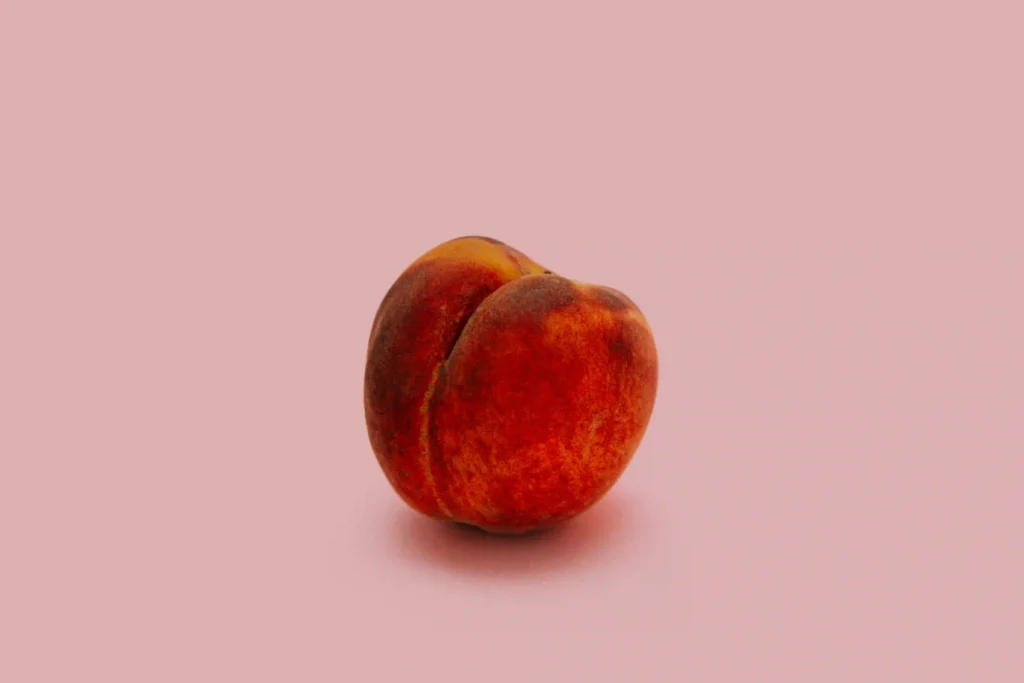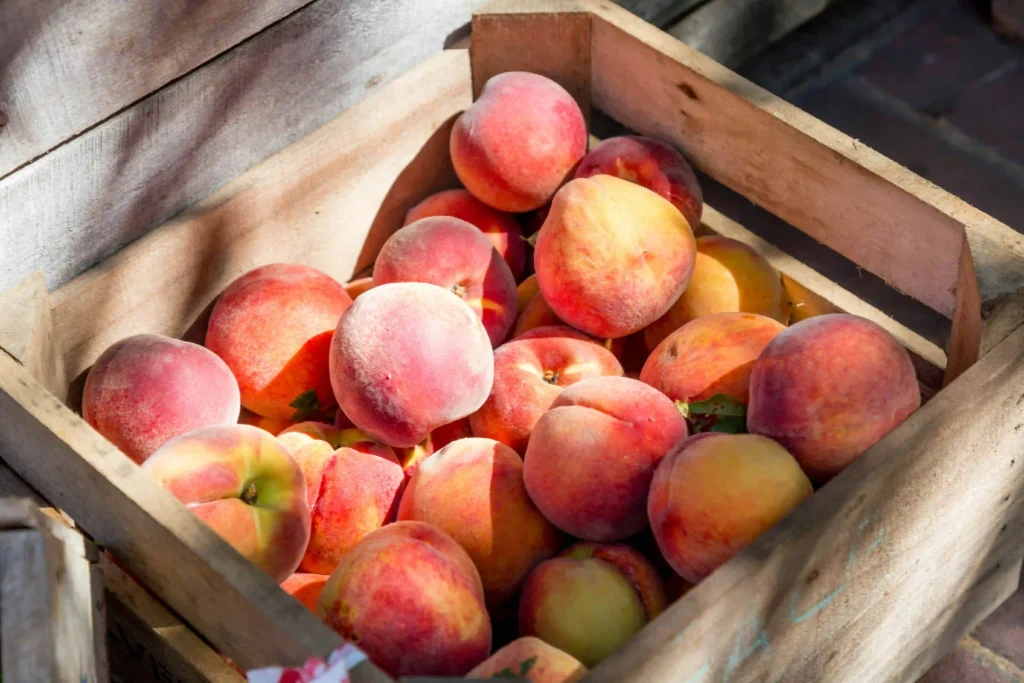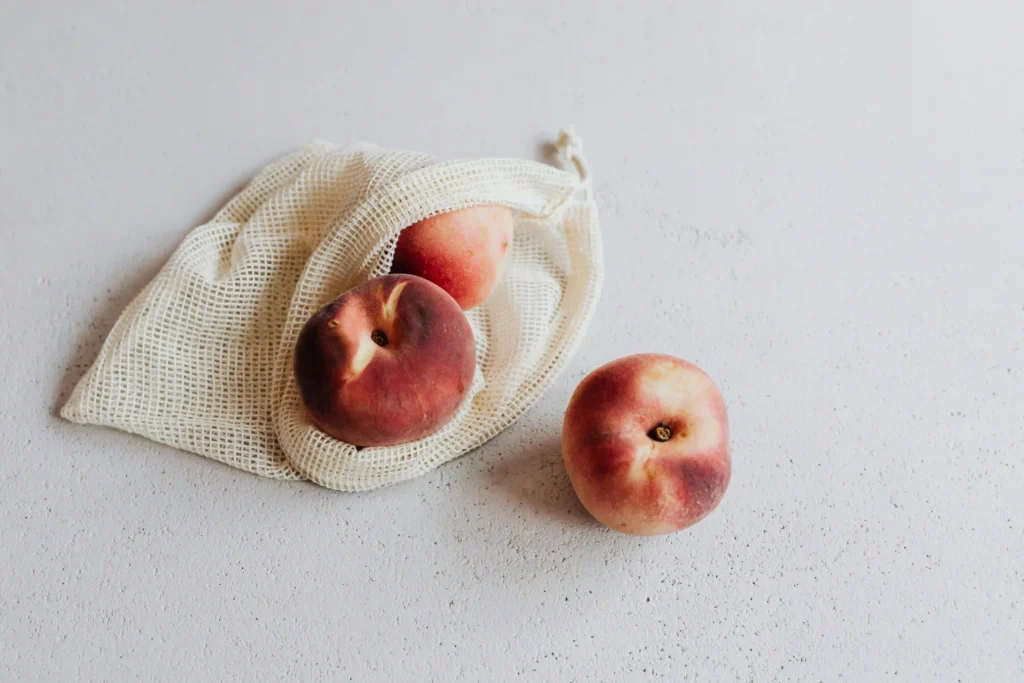Introduction

Peaches are tasty and healthy but not necessarily for all: Possible side effects. They are harmless to some people’s digestion but may cause the others to have some uneasy feelings. This blog discusses whether peaches can lead to diarrhea, and the cause for such effects.
Table of Contents
Can Peach Cause Diarrhea?
Of course, the peaches may lead to diarrhea in some people through their fiber as well as sorbitol content which may be harmful to the stomach.
This fruit is also rich in dietary fats and natural fructose such as sorbitol which has a laxative effect. Though these components are useful when taken in moderate amounts, their presence in meal’s can be dangerous for individuals with sensitive tums or any pre-existing gastrointestinal complications. Sorbitol is also a kind of laxative that promotes water into the intestine, so taking too much of it will cause diarrhea. Moreover, the skin of peaches also holds fiber that may also cause aggravation of the lining of the digestive system. Anyone suffering from IBS or fructose intolerance is most likely going to have diarrhea when they consume peaches. To reduce the likelihood, strictly limit the amount of peaches you eat and pay strict attention to any negative reaction your body has to this fruit.
Can You Eat Peaches If You Have Diarrhea?
This fruit is contraindicated during diarrhea because of its high content of fiber and sugar.
In this case, the system making the body’s food is more sensitive to what it is processing than it normally is. Peach, as fiber-containing fruits, can make the situation worse by increasing movements in the bowel. Moreover, peaches contain sorbitol which has harmlessly fructose like symmetry and may cause water retention in the intestines resulting into increased stool looseness. For those who may be suffering from diarrhea the doctor advises them to take foods with little fiber such as bananas, rice, applesauce, toast (The BRAT diet). These foods are the least fiber enriched and will cause little upset in the stomach. It can even slow the patient’s recovery if peaches are brought back into their diet too soon. If symptoms worsen, they should avoid peaches or if they subside, then peaches can be slowly reintroduced into their diet to determine food tolerance. When unsure about your case or in case of lasting diarrhea or severe diarrhea, seek medical advice from your doctor.
Why Do Some People Get Diarrhea After Eating Peaches?
Diarrhea after consuming peaches results from intolerance to the natural sugar(sorbitol) and the richness of the fruit in fiber.
One type of sugar alcohol present in peaches includes sorbitol which especially affect people with sensitive stomachs or those whom have taken too much of it. This compound leads to retention of water in the intestines results in increased frequency of stools and softness. Furthermore, peaches contain fiber, which is not only good for chronic digestion, but can upset the gut when taken in large amounts. However, with fructose intolerance or IBS, such negative impacts of the product are much more pronounced. Allergies to peach proteins may at times lead to digestive complications which are very rare. It is advisable that those affected by sensitivity avoid peach consumption or take it in limited proportions while ensuring they take well ripened and well washed fruits so as to avoid taking along with it compounds that may cause irritation.
Is Diarrhea a Common Side Effect of Eating Peaches?
No, diarrhea is not among the common side effects of eating peaches but this may occur in those, with special unhealthy reactions, and intolerances to certain fruits or foods.
Peaches are generally safe for majority of the population to consume in large quantities. But the reported side effects include diarrhea to those with sensitivity to sorbitol or those that have issues with high fiber products. Any product of a peach tree, fresh or dried, should be avoided in large measures or eaten unripe because they can cause loose bowels that result from compiling the digestive system’s activity. Presumably, some infringement of the standard of hygiene, or pesticide residuals of the fruit may be also attributed to stomach upset. Although such cases are not quite frequent, they call for moderation, and appropriate preparation when taking fruit, especially peaches. Often symptoms appear because of certain food intolerances or allergies, therefore, it is advisable to see a doctor if the symptoms are frequent or constant.
Can Overripe Peaches Cause Digestive Issues?

Yes, overripe peaches are probably not good for you because they contain a lot of sugar and can ferment too; that makes them gassy – bloating, gas, or possibly diarrhea.
Peaches are soft fruits which develop certain amount of sweetness as the ripen and their sugars are also concentrated. They may also turn bad and begin to ferment especially where they are not placed in the refrigerator soon after they have become overripe. Such a fermentation process might cause gas as well as discomfort in the gut, slight bloating or even watery stool. Moreover, while overripe peaches have a softer texture which may not be good for digestion by stomach sensitive individuals. However, to avoid trouble with your digestive system, eat peaches when they are still slightly firm; do not take overripe or spoiled peaches. Refrigeration can also prolong their usable time if not for fermentation hence the tummy upset which can be avoided if the food is well stored in the refrigerator.
Do Peaches Trigger Diarrhea in People with Sensitive Stomachs?
Indeed, peaches are capable of causing diarrhea especially to persons with sensitive tummies in view of the fact that they contain sorbitol and a lot of fiber.
On the same note, products containing Sorbitol a natural sugar alcohol obtained from peaches have a reputation for causing mild to severe diarrhea, especially within sensitive stomach tracts. Moreover, it has a high value of fiber and it may cause impact on the bowel movements or may lead to diarrhea to some individuals. People who have diseases that cause them to have sensitive stomachs are the ones who are most affected, for example, IBS, fructose intolerant people. Some of these risks can be minimized by peeling peaches and also by the consumption of peach products in reasonable proportions. Individual tolerances must also be closely watched since different people may not take certain components of the peaches well. Seeing a doctor may be useful to know what kind of foods cause discomfort and how to cope with digestive sensitivity.
Are Peaches Safe for People with IBS or Diarrhea?
They contain sorbitol which is an osmotic laxative and also have fiber which also worsens IBS and/or diarrhea.
People with IBS or diarrhea may be more intolerant to foods containing what are called FODMAPs (fermentable oligosaccharides, disaccharides, monosaccharides, and polyols). However, they contain sorbitol which is a polyol and is very likely to increase the swelling worst in an IBS. Despite the fact that fiber is otherwise beneficial, it can exacerbate the condition of the digestive tract during diarrhea. Everyone having IBS should consider eating peaches in small portions more especially when the IBS flares up. In some cases, diarrhea may develop: but the best solution here is to temporarily exclude peaches from the diet and switch to other low-FODMAP fruits such as bananas or berries. A respected dietitian can give specific advice on the proper diet to follow in order to have a healthy lifestyle with IBS.
Can Peach Skin Contribute to Diarrhea Symptoms?
Yes, peach skin is awful for diarrhea symptoms because includes too much fiber which causes unprecedented discomfort to sensitive stomachs.
The coverings of peaches contain a good amount of insoluble fiber that swells in water and speeds up bowel movements. Although this is good for preventing constipation it may be disadvantages for individuals who have loose bowel movements or sensitive stomachs because this will make bowel movements worse. Besides, the skin might be still contaminated with pesticide or bacteria if washed poorly which could worsen digestion. For those, who easily become given diarrhea or any sorts of disorders in their stomach, then they should better peel the peaches before eating them since it will lower down the quantity of fiber and, therefore, will not harm their stomach. One way of avoiding the symptoms that are caused by contamination is also washing the peaches right by checking that they have been washed to the best of our ability. Inclusion of peaches in our diets and moderation is good for our health provided they are well prepared austerely.
Do Peaches Act as a Natural Laxative?
Indeed, peaches are a natural laxative since they contain water soluble fiber, sorbitol which helps to ease constipation.
Peaches are rich in dietary fiber and therefore contributes to soft formed well-formed stool to ease bowel movement. The forms of fluids contain sorbitol natural substance similar to sugar alcohol that makes them have a mild laxative effect. The condition is aided by the fact that sorbitol has a laxative effect since it acts as a osmotic agent to pull water to the intestines in order to soften feces. Moreover, peaches provide loads of water content in the body hence are helpful in facilitating efficient digestion. For this reason, peaches can be recommended for use in relieving mild cases of constipation naturally. However, the high intake of this product may cause a side effect that is loosed stool or diarrhea especially to those with a sensitive stomach. Energy wise, moderation is vital if the gains of peaches are to be received without reception of the side effects.
Are Peaches Linked to Food Sensitivities or Allergies?
Indeed, peach is feared to cause food sensitivities or allergy in some people that may result to itching, swelling, or even stomach upset.
Peach fruits contain proteins that can trigger off an allergic response in people with OAS especially. The signs usually involve dysphagia or a burning sensation in the mouth, lips, or throat. In severe condition exposures cause rashes, inflammation of the skin, or difficulty in breathing. Moreover, there are some individuals who may have a reaction to the Peach apart from the allergy, that comprise of stomach discomfort such as constipation or intestinal colic, and diarrhea. Peach proteins believed to be responsible for allergic reactions can be inactivated by cooking or peeling because they are trapped in the peach skin. When the signs are still present or become serious, it is advisable to visit an allergist to get a diagnose and more so a pediatrician for a peach allergy or any sensitivity to it.
Does the Fiber in Peaches Cause Digestive Upset?

Yes, the fiber in peaches can lead to bloating, gas, or diarrhea in your stomach for those who are sensitive with fiber vegetables or eat plenty of peaches in one sitting.
Dietary fibers found in peaches hence benefits the gut by increasing mucus membrane movements, as well as offering nutrients for normal and healthy gut bacteria. Nonetheless, fiber overload happens in cases where a diet with massive fiber portions is new to the body. The skin of peach contains insoluble fiber that can make the intestine worse, causing bloating or discomfort. Such effects can be especially common among persons with sensitive stomach or any intestinal disorder such as IBS. In case you are experiencing some digestive issues you should consume peaches in limited quantities, recommended diet, and water. The fruits when peeled or eaten cooked also have lower fiber effect on the body, thus making them more easily digestible. You can also learn about Can Peaches Be Refrigerated?.
Can Peaches Worsen Diarrhea in Kids and Toddlers?
Yes, peaches are not very good for children and toddlers suffering from diarrhea because of their natural sugars, fiber they contain and sorbitol which makes the situation worse.
Sorbitol, a sugar alcohol found in peaches, high water and fiber in peaches makes it to cause diarrhea in children. Sorbitol has the ability to absorb water within the intestines; beneficial if you suffer from constipation but really bad if you have diarrhea. Because young digestive systems are generally more sensitive to these components, consumption of peaches during diarrhea is advised against. Moreover, these ripened peaches also cause fermentation and could result in worsening their stomach conditions. As for peaches, it is not recommended that parents feed their children with raw peaches when they are suffering from diarrhea, instead of them should feed them with foods which are low in fiber, such as rice or bananas. When guest are offered peaches it is better to offer them with skin removed and in small pieces so that those with sensitive stomachs will not be irritated.
How to Prevent Diarrhea When Eating Peaches?
To avoid getting diarrhea from eating peaches, ensure that you take small portions, avoid ripe peaches and ensure that if you are sensitive to the skin you can take the peeled peaches.
However, to avoid cases of developing diarrhea when taking peaches there is need to practice precautions when taking the fruit. Naturally ripened peaches must be sweet because a raw fruit contains more sugars and sorbitol, which are irritating to the stomach, so the proper peach must be chosen. The skins are slippery and contain insoluble fiber that might cause irritation on sensitive stomachs; therefore, peaches should be peeled. It’s also worth starting with small portions of peaches, especially if you haven’t included many fibrous meals in your diet before. To cushion the effects of peach fibers on the human system, preparing peaches with other foods that are low in fiber will be a good idea. Consumption of peaches together with lots of water also urges clearance of fiber in the body and averts extremes of dehydration that would worsen diarrhea symptoms. For those who have digestive problems to start with, it is equally important to prepare peaches in order to reduce on the amount of bulk that they possess.
Are Canned or Fresh Peaches More Likely to Cause Diarrhea?
Canned peaches are more likely to promote cases of loose stool than fresh peaches because of sugars or syrups that is usually added to it.
Canned peaches are usually packed in sugary liquids making them contain a lot of sugar than fresh peaches. Accumulation of the sugar implies an osmosis action whereby water is pulled into the intestines causing diarrhea, especially for sensitive stomachs. Also, most canned peaches must include other preservatives or additives that could also adversely affect the gut. Fresh peaches consumed moderately should not cause digestive problems except perhaps if they are ripe. However, for some people, they have natural fiber and contain sorbitol, which can be gastrointestinal sensitive issues. In case of using canned peaches the best one to use is the ones that are canned in natural juice and no sugar added. Draining and rinsing the syrup also reduces the incidences of digestion upsets.
Conclusion
Despite a peach is a tasty and healthy product, they can differently affect the state of digestion in different individuals. Although some people might only have some minor gastrointestinal troubles, including diarrhea, learning why this happens and being more aware of the choices you make—such as eating fresh, peeled peaches and perhaps limiting peach consumption, or only eating fresh fruit and not canned versions—can go a long way towards avoiding problems. Whenever consumed wisely, peaches should be largely harmless for the vast majority of people with no potential to harm consumers in any way, as they really are a ‘healthy’ food source thanks to the fiber, vitamins, and hydration that they offer. Therefore, identifying this the way your body reacts to peaches and taking precaution will see you enjoy the sweet fruit without upsetting your digestive system. Raw or cooked, whether canned or direct from the grocery shelf, peaches is really part of any healthy meal plan when taken in moderation.